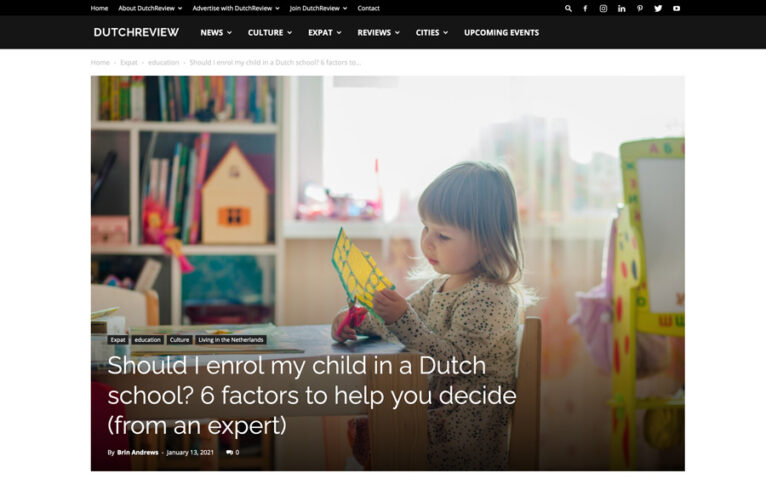There are many factors to consider when deciding whether to send your child to a Dutch school or an international school in the Netherlands.
We spoke with Anita Hensen, a Dutch education expert from Young Expat Services (YES), to find out how expat parents can make the best choice for their families.
Not only did Anita break down the top six circumstances to consider when deciding where to enrol your child, but she also helped us sort out a handy pros and cons list — to make this important decision just a little bit easier.
Top 6 factors to consider when choosing a school for your child in the Netherlands
6. Consider your length of stay in the Netherlands
One of the first things to think about is whether you’ll be staying in the country for only a short time or settling in for a longer time. If short-term (less than three years), it may be easier to go to an international school, especially if you and your child already speak English.
Otherwise, if you plan to stay in the Netherlands for longer than three years, a Dutch school can be a good plan for integration. Speaking Dutch opens all kinds of opportunities for your child to communicate with more people, and participate in sports and other after school activities.
5. Contemplate the value of a “soft landing”
Moving to a new country is already a big change. If your child speaks English, consider the impact of language on your child’s social integration. At an international school, it will be easier to communicate and start making friends. This can also apply to you as a parent, as you’ll meet plenty of other parents in the same situation as you.
On the flip side, a soft landing can also be when a child learns Dutch and can play with the children on the playground and in sports or other after school activities. Keep in mind, in bigger cities, there can be over 20 nationalities in regular Dutch schools, so your child won’t be the only one from a different background.
4. Take your child’s age into account
From four to five years old, children pick up a new language with relative ease. Dutch schools focus on learning through playing, Dutch language acquisition, social and motor skills and gradual preparation for reading and writing. When it’s time to begin learning formal reading and writing at age six, children have developed the necessary foundation.
It’s also useful to know that most options for daycare or preschool are in Dutch. Other options are rare, so your child will already begin to learn the language before going to a primary school.
From the age of six, to learn Dutch, children need to go to a Dutch language immersion class called Nieuwkomerklassen (in some cities from the age of four). After one year of immersion, children can attend their regular Dutch school and join their peers of the same age.
It takes more time for children age 10 and up to learn Dutch — they may need to repeat at least one school year.
3. Weigh the difference in cost
There is a vast difference in costs among schools in the Netherlands. Dutch schools are government-funded. Parents pay a parental contribution that adds up to around €60 to €150 per year, and maybe a bit extra for “in-between school care” (caretakers during lunchtime).
International schools come with a significantly higher price tag — between €4,500 and €23,000 each year. For the Dutch international schools on the lower end of the cost spectrum, you’ll need to fulfil certain placement requirements.
2. Contemplate the different curriculums
Dutch schools offer some unique choices for education. State-funded schools will often follow different philosophies, religions, and pedagogical principles, all within the Dutch curriculum.
In secondary schools, there are further options for children who have already learned Dutch, which can be interesting if you plan to stay longer in the Netherlands. After the age of 12, children attend a secondary school with different levels (VMBO, Havo, VWO, Gymnasium).
If you opt for international schooling, decide if your child would benefit most from an IB (International Baccalaureate), British, or American curriculum. You don’t need to be an expert in the distinctions between them, just keep in mind that your choice may make a difference if you anticipate another international move in the future.
It’s also helpful to consider if your child has the academic skills for an IB curriculum or whether you’d prefer a school where a vocational program is also available.
1. Think about when you want to take your vacations
Dutch schools enforce strict attendance rules from the age of five. Your child will only be able to miss school for specific reasons, such as important celebrations or family emergencies.
International schools also highly discourage absence but are not as strict in their policy. They also offer more flexibility with time off and longer breaks for summer and winter holidays (although school days do tend to be longer).
Pros and cons of sending your child to a Dutch school
Still looking for a bit more clarity? With Anita’s help, we’ve broken down some of the pros and cons of Dutch schools for expat parents to consider when making their choice.
Dutch School Pros & Cons
Pros
- Complete language immersion (the best way to learn a new language!).
- Jumpstart integration into the Netherlands. Your kids will make Dutch friends, can join Dutch clubs, and you can meet Dutch parents.
- In all bigger cities, there is a special language school for your children.
- Easier on the wallet.
- Your child can become used to life’s twists and turns.
- Location — there is always a Dutch school in your area.
Cons
- It’s a big change.
- Potential setback while switching education systems/school years.
- Different curriculum when you move again.
- Possibly repeat a year while learning Dutch.
- Changing schools after a year when attending a language school — the first year you often need to travel more.
- You may find it difficult to understand your child’s homework assignments.
- Fewer absences are permitted.
International School Pros and Cons
Pros
- Your child has a soft landing, making friends and communicating with ease if they already speak English.
- Curriculum may be more compatible with a future international move.
- Easier to transition later if you aren’t staying in the Netherlands long-term.
- You can communicate easily with other parents.
- Easier to excuse your child from school, if needed.
- Longer breaks for summer and Christmas.
Cons
- Can be significantly more expensive.
- Fewer international schools in the Netherlands means you may have to travel further.
- Can prevent children from learning Dutch.
- If you plan to stay long-term, your child (and family) will have a slower integration into Dutch society.
- Often longer school days.
- If your child doesn’t already speak English it will be a difficult adjustment.
How to make the final decision
Every family has a unique combination of budget, age, native language, and duration of stay in the Netherlands. Consider what’s right for your family, and contact the experts at YES for any lingering questions you might have. They’re happy to help!
Have you had to make this challenging decision about where to send your child to school in the Netherlands, or are you currently trying to decide? Tell us about it in the comments below!



